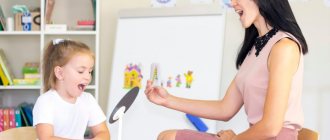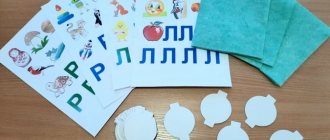The main forms of organizing work with children with speech impairments at the speech therapy center of a preschool educational institution are individual, subgroup classes and classes in small groups.
The predominant form of correctional work in the preschool educational institution’s speech center is individual lessons, because the use of this form of work allows you to successfully establish contact and understanding between the speech therapist and the child. The duration and frequency of individual lessons is determined by a specialist and depends on the severity of disorders of the articulatory apparatus and delays in speech development. Typically, individual lessons last no more than 20 minutes and are held twice a week.
The main goal of an individual lesson is: selection of complex exercises aimed at eliminating specific disorders of the sound side of speech.
Objectives of an individual lesson
| Educational objectives | Formation of the concept of the mechanism of sound formation and its acoustic features; formation or consolidation of knowledge about a syllable, a word, a sentence; consolidation of the dictionary or clarification of words containing a given sound on a lexical topic (this could be “Toys”, “Autumn”, “Shoes”, etc.) |
| Corrective tasks | Development and improvement of articulatory motor skills; formation of rules for oral exhalation taking into account this phoneme; development of phonemic hearing and voice; formation of conditioned reflex connections to a given articulatory-acoustic image |
| Educational tasks | Correction of the child’s personality as a whole. |
Below, I would like to present to you, dear colleagues, the structure of an individual lesson.
The main directions of speech therapy work with children of preschool and school age.
For grades 1 - 4, the general education “Correctional Linguistic Course” of a special (correctional) school includes special subjects (“Pronunciation”, “Speech Development” (the world around us), as well as general education subjects adapted for students with speech pathology (“Teaching literacy ", "Phonetics, grammar, spelling", "Reading"). The goal of the course is: the formation of full-fledged speech activity as one of the most important prerequisites for successful learning and a means of adapting the individual in society.In accordance with this goal, the tasks of the correctional linguistic course in primary school are set: • filling the gaps of speech underdevelopment of children and the resulting impairment of speech-thought processes; • development and enrichment of ideas about the world around us as a basis for expanding the lexical and grammatical aspects of speech, coherent oral and written statements; • formation of skills and abilities necessary to speak, read meaningfully, listen and engage in speech activity at the level of written speech; • obtaining information on phonetics, grammar, spelling and initial ideas about literature. The subject “Speech Development” (the world around us) is integrated and includes elements of the basics of life safety. “Speech Development” (the world around us) is aimed at expanding ideas about the world around us, that is, it has a social orientation, therefore the “World Around us” curriculum is an integral part of the “Speech Development” program. The content of general education involves: • clarification and filling of specific ideas about the world around us, familiarity with natural and social phenomena; • improvement and formation of the skill of understanding coherent speech; creating a basis for mastering the written form of coherent speech: literary, popular science, journalistic, etc.; • development of understanding of colloquial speech, descriptive and narrative speech, grammatical structure of the language. The subject “Pronunciation” is aimed at developing clear, correct speech in students based on the development of phonemic perception, skills of analysis and synthesis of the sound composition of a word for mastering literacy. The task of pronunciation work is to develop clear, smooth, expressive speech, accompanied by correction of the prosodic side of speech, as well as work on the development of mobility and clarity of movements of the articulatory apparatus. The subject "Literacy" is a continuation of the subject "Pronunciation". The subject “Teaching literacy” assumes the following content: • filling gaps in preschool speech development; • preparation for mastering the sound composition of a word; • ability to navigate on a sheet of paper; • preparation and training in writing techniques; • students mastering conscious smooth syllabic reading, correct intonation when reading and telling. The corrective focus of the subject contributes to the development of auditory attention, development and correction of motor skills of small muscles of the hand. The subject “Phonetics, Grammar, Spelling” is aimed at consolidating the grammatical patterns of the native language that students have practically mastered, at developing the skills of phonetically correct conversational speech, at expanding the vocabulary of students, taking into account the characteristics of children with severe speech impairments, and the ability to use knowledge to solve cognitive, practical and communication tasks. The subject program “Phonics, Grammar, Spelling” helps to form the foundations for elementary school graduates to engage in speech activity at the written level. The native language acts not only as a subject of instruction, but also as a means of teaching other disciplines. The content of the program is aimed at the ability to analyze what you read, establish cause-and-effect relationships, the ability to draw up a plan, text, convey its content, i.e., master oral and written language. The program displays knowledge from the field of phonetics, grammar, morphology, which are most often used by children aged 7–10 years in the process of verbal communication, and age-related characteristics of cognitive activity. Much attention is paid to penmanship and work on mastering the rules of pronunciation. Special lessons on coherent speech are included in the number of hours of topics studied. Sound-letter analysis is carried out systematically in order to develop the skills of error-free writing of words and the development of spelling skills.
The subject "Reading" is a continuation of the course "Teaching literacy". Reading provides, in addition to solving educational, correctional and educational problems, the use of reading as a corrective means of speech development. The subject “Reading” is used as an effective means of reinforcing the correct pronunciation of sounds and words of various syllable structures, accumulating and enriching vocabulary. The most important tasks are: • formation and improvement of reading skills (as one of the types of speech activity), its fluency, awareness, expressiveness; nurturing a meaningful perception of a work, the ability to navigate a read text; • developing skills and abilities to work with books and texts of different styles and genres; • developing the ability to retell what you read, highlight the main idea and draw up a retelling plan; • developing an interest in independent reading and the ability to select literature of interest, use reference sources to understand and obtain additional information.
The structure of an individual lesson at the stage of sound production
- Organizing time
- Articulation exercises: general articulation exercises, special articulation exercises, exercises to develop the strength of the voice and exhalation.
- Announcing the topic of the lesson to the child.
- Sound production (by imitation, from a preserved phoneme, from articulation exercises, by mechanical influence).
- Analysis of articulation according to plan: position of the lips, position of the teeth, position of the tongue (tip, back, root), participation of the vocal folds, nature of the exhaled stream.
- Consolidating isolated sound: pronunciation, onomatopoeia games.
- Development of phonemic hearing: sound recognition in a series of isolated sounds, distant in articulatory and acoustic characteristics, in syllables, taking into account the above recommendations, in words, in sentences, in text.
- Consolidating the pronunciation of sounds in words.
- Homework.
- Result of the lesson: repetition of which sound was practiced during the lesson, analysis of the main provisions of the articulation of the sound being studied, final pronunciation.
- Assessment of a child’s work in class is carried out with a positive psychological focus.
And in conclusion, I would like to note that when preparing and conducting an individual lesson, it is very important to remember that throughout the entire lesson the child must maintain a strong positive emotional attitude, which is expressed in the desire to study. This is achieved by using surprise moments, game fragments, exciting tasks and exercises, during which the learning process turns into an interesting game.
The purpose and objectives of educational work in a speech therapy group
Educational work in a speech therapy group differs from educational work in a regular preschool group in that it is interconnected with correctional activities that are organized with children with various speech disorders.
In addition, children of the logogroup quite often, in addition to speech deviations, also have minor developmental deviations. Based on these characteristics, educational work should be built. Note 1
The goal of educational work in the speech therapy group: comprehensive and complete development of preschool children, taking into account their age and individual capabilities and needs.
Objectives of educational work:
Are you an expert in this subject area? We invite you to become the author of the Directory Working Conditions
- Children's assimilation of generally accepted rules and norms of behavior.
- Achieving stable results in mastering the general education program.
- Formation of moral and aesthetic qualities of the individual.
- Developing skills to maintain and strengthen one’s own health and the need for a healthy lifestyle.
- Formation of stable communication skills for successful interaction with others.
- Organization of an effective subject-development environment that promotes the overall development and personality development of preschool children, as well as the full development of speech.
Achieving the set goals and objectives of educational work in the logogroup is carried out through the professional activities of the teacher. That is why it is important that all teachers working with children constantly improve their knowledge and skills by studying pedagogical and methodological literature, attending advanced training courses and familiarizing themselves with the practical experience of their colleagues.
Who needs speech therapy sessions?
Nowadays, few people are surprised that schools offer speech therapy classes for children, and there are reasons for this. While the baby goes to kindergarten, to a familiar group where everyone knows him, his loved ones may not notice his speech “defects” (fuzzy sounds, incorrect stress, rearrangement of syllables, distorted sentence construction). At school, the child finds himself in a completely new environment. How will he build relationships in the classroom? Poor diction will interfere with both communication and responding in class. He will begin to feel embarrassed and withdrawn.
Parents of future first-graders, start speech therapy classes with a 6-year-old child, even if he already clearly pronounces all sounds, reads and writes, it won’t hurt.
IMPORTANT!
In addition to difficult social adaptation, speech development disorders result in huge school problems - from poor reading to... failing the Unified State Exam.
Because deviations such as dyslexia (difficulties in reading, misunderstanding of text), dysgraphia (problems with written speech, omissions or rearrangements of letters), dysorthography (understanding of spelling rules, but inability to apply them in writing) catastrophically affect the speed and quality of learning.
If problems with speech or reading are noticeable, the child should be treated by a speech therapist. How to do this in self-isolation? There are free classes with speech therapists on the Internet: specialists conduct master classes for parents or trial lessons online. Undoubtedly, it is better to practice in person, because it is unrealistic to massage the tongue through a monitor. But you can conduct some speech therapy classes with your child at home, more on that later.
IMPORTANT!
A speech therapist is a qualified teacher-defectologist with specific knowledge in the field of medicine (neuropsychology, physiology, neurology, etc.).
Exercises that are easy to do at home
School classes are currently unavailable. Do you have homework from the speech therapist? If not, we'll give you some tips.
Exercises on sounds and vocabulary can be easily combined with household chores or will come in handy on the way to the dacha. Elements of competition increase interest, you don’t have to think about where to start a speech therapy session, just invite your child to play:
- In tongue twisters: who will repeat it cleaner and faster?
- In all honesty: who can come up with a funnier idea?
- In words with one letter or one syllable: who will remember more? What is around with this letter?
- In hide-and-seek words (where given sounds are hidden): who will make up more?
For dyslexia and dysgraphia, puzzles, lotto with syllables and words, the game “Word Maker”, fillwords (find words in a square filled with letters) will help - there are many ideas in this direction.
To develop coherent speech, make up stories based on pictures. It is recommended to listen to melodies and tell each other what you imagine when you hear a particular composition. Learn short poems and discuss their meaning.



